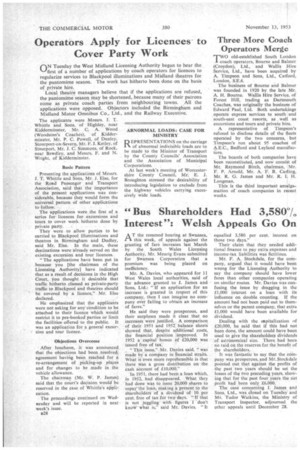"Bus Shareholders Had 3,5807 0
Page 62

If you've noticed an error in this article please click here to report it so we can fix it.
Interest": Welsh Appeals Go On
AT the resumedhearing at Swansea, this week, of appeals against the granting of fare increases last March by the South Wales Licensing Authority, Mr. Meurig Evans submitted for Swansea Corporation that a premium was being placed on inefficiency.
Mr. A. Davies, who appeared for 11 West Wales local authorities, said of the advance granted to J. James and Sons, Ltd.: "If an application for an increase is granted in respect of this company, then 1 can imagine no company ever failing to obtain an increase of fares."
He said they were prosperous, and their surpluses made it clear that no increases were justified. A comparison of their 1951 and 1952, balance sheets showed that, despite additional costs, the financial position improved. In 1952 a capital bonus Of £20,000 was issued free of tax. , "This issue," Mr. Davies said, "was made by a company in financial straits. What is evenmore reprehensible is that there was a gross distribution on the Cash account of £10,000."
In 1951. there had been a loan which, in 1952, had disappeared. What they had done was to issue 20,000 shares to repay' the loan, making a present to the shareholders of a dividend of 10 per cent, free of tax for two days. " If that is not juggling with figures 1 "don't know what is," said Mr. Davies. "It
equalled 3,580 per cent. interest on those two days."
Their claim that they needed additional finance to pay extra expenses and income-tax liabilities was fictitious.
. Mr. F. A. Stockdate, for the company, argued that it would have been wrong for the Licensing Authority to say the company should have lower fares than other companies operating on similar routes. Mr. Davies was confusing the issue by dragging in the £1,000 interest on a loan with its influence on double counting. If the amount had not been paid out to themselves or the parent company, that extra £1,000 would have been available for dividend.
Dealing with the capitalization of £20,000, he said that if this had not been done, the amount could have been used to give the shareholders dividends -of astronomical size. There had been no raid on the reserves for the benefit of the shareholders.
It was fantastic to say that the company was prosperous, and Mr. Stock dale pointed out that against the profits of the past two years should be set the losses of the two preceding years, showing that for the past four, years the net profit had been only £6,000.
The case concerning J. James_ and Sons, Ltd., was closed on Tuesdayand Mr. Tudor Watkins, the Ministry of Transport inspector, adjourned the other appeals until December 28.












































































































































































































































